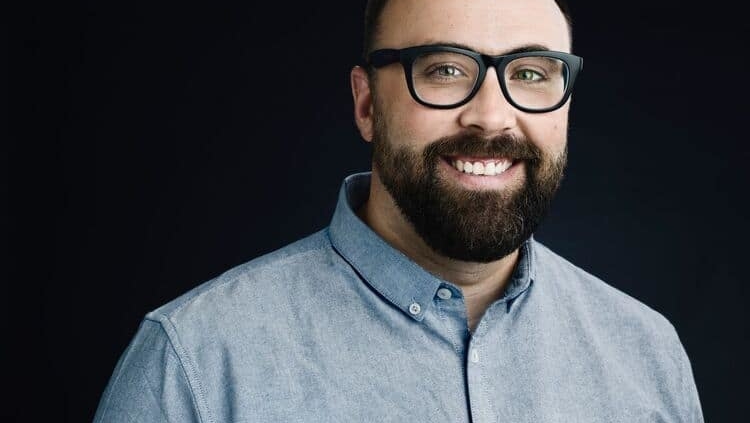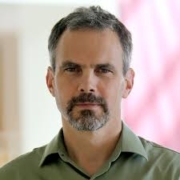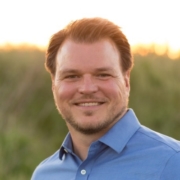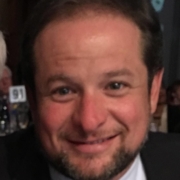Teaching is a profession that must respond to the changing social world. From new technology and curriculum reforms to privatization and climate change – teachers are on the front-lines of a complex system that has huge consequences for the future. In this context, what is it like to be a teacher today? How do teachers manage the competing pressures?
My guest today is Armand Doucet, an award-winning teacher recognized around the world. Nominated in the Top 50 for the Global Teacher Prize, Armand is a high school history teacher in New Brunswick, Canada and the author of the new book Teaching Life: Our Calling, Our Choices, Our Challenges.
Citation: Doucet, Armand, interview with Will Brehm, FreshEd, 170, podcast audio, September 2, 2019. https://www.freshedpodcast.com/armanddoucet/
Transcript, Translation, Resources:
Will Brehm 1:08
Armand Doucet, welcome to FreshEd.
Armand Doucet 1:10
Thank you for having me, Will.
Will Brehm 1:11
So, when did you first join a union?
Armand Doucet 1:13
In Canada -in New Brunswick where I’m from- you need to be part of the union to be hired. So, once you get hired, you’re part of the union. It sort of happens concurrently, I guess. But I was extremely proud to join it, because it’s got quite the historical reputation, but also has developed rights within my province and has been a huge part for developing rights for all people. So, I was quite excited to be part of it.
Will Brehm 1:45
Yeah, right. And you were a coach before you became a teacher? Is that correct?
Armand Doucet 1:51
Yeah. So, I was a soccer coach from a very young age and then coached at the university level, and participated with provincial technical director stuff, so. And then from there, I actually worked in sales and marketing for a Forbes 500 company for a good seven years.
Will Brehm 2:10
Wow. So, you had a very different trajectory into education than maybe is typical.
Armand Doucet 2:15
Yeah, some of them call it eclectic. Usually the pathway to education, particularly in the Western Hemisphere, would be K to 12, university, maybe summer jobs, and then directly into a teaching position. You see that less than less, particularly in the US, where teacher education models have changed. That’s not necessarily a good thing but I do believe that a pathway that brings you to try other things and see other things is definitely a benefit to the classroom.
Will Brehm 2:50
So, how is it a benefit to the classroom? How is being a coach? How is working for a big international company? How has it been helpful for you, inside the classroom?
Armand Doucet 2:58
I think the major part of the network, right? If you go from K to 12 and then into university, then back into schools, your network is very much relying on your friends and on your partner’s friends, and maybe some family acquaintances. This experience for me has really given me a broad network of NGOs, business, professionals that I can lean on when I don’t have the expertise when I’m trying to facilitate the journey for each student but also to help my colleagues in that situation as well, right? So, you’re looking at SDGs, sustainable development goals, and trying to bring those to the classroom? Well, those are complex! There’s a reason why we’re trying to find solutions. And if you’re trying to bring that forward with kids, and you don’t have the expertise, maybe then this type of network is really something that you can lean on and bring that type of expertise. So, I think that’s one thing that’s really beneficial to the classroom.
Will Brehm 3:57
In your new book, you sort of focus in part on changes inside classrooms when teachers are so busy. So how do teachers manage their such busy lives? It’s just an incredibly demanding job. How are they -and the students must be so busy as well. So, you know, in your experience, you’ve won awards for teaching, you’ve spoken with teachers from all over the world, you’re involved in the union, you work in a school. How are teachers managing all of these changes in the classroom?
Armand Doucet 4:29
I think the first one is that you’re not alone. And to realize that the four walls that used to keep us within it are now breaking down, and that you need to rely on your network of colleagues, your network outside and to be really humble about it, right? Like, we don’t know everything. And you’re not supposed to either. I mean, your content knowledge, maybe, but -I teach history and world issues and realistically, the content knowledge is written from one perspective, right? So, is it the complete truth? No. And that’s where you need to go and search it out. So, I mean, the approach to the classroom is to start by being humble and by acknowledging that you’re there for one reason and one reason only, and it’s to help those kids learn, right? If you’re not there for that reason, you’re not there for the good reason. And I mean, that could be anything else, right? You’re there for the salary, for the perceived vacation but the reality is, you know, it takes us three weeks to unwind. And then you’re already thinking about the new year, right? So, I think it’s something that is extremely hard nowadays, right? Because there’s so much pressure on the classroom. There’s so much riding on what’s going to happen. And everybody’s got a perception of what’s happening in the classroom but no one wants to take necessarily the accountability for it. So, it falls only on the teacher shoulders oftentimes. I’m still waiting for Marvel to come out with a superhero that’s a teacher to tell you the honest to God truth. And I think it’d be awesome.
Will Brehm 6:00
Would it make you cry?
Armand Doucet 6:02
I think it would! Not disclaimer, but when Iron Man passes away, I’m thinking this is the right time to put a teacher in there.
Will Brehm 6:13
So, I mean, some of these pressures that teachers must face, it is very much about these accountability structures that exist in schools. It’s very much about pressure on technology and all these different companies that must be coming in and offering products to teachers to make their lives easier. How do teachers manage that pressure on a daily basis?
Armand Doucet 6:39
It depends where you are in the world –
Will Brehm 6:41
But in your experience.
Armand Doucet 6:41
Yeah, in my experience it’s focusing on the child. I think that’s first and foremost. The narrowing of what education is, and the narrowing of the focus of what education is, even though everybody doesn’t want that. That’s what’s happening with a lot of the structures and policies that are put into place. You know, you look at the US and the driving of standardized testing and the implication that that has directly on the classroom, even though they’re asking for competency skills, mental health, social, emotional, and curriculum outcomes. The reality is, the mission and vision is not aligning with what’s actually happening in the classroom. So, you need to go back to why am I here and focus on those children and really take a look at, okay, they need to grow. And to grow is many different things. But that eliminates that narrow view of education in my mind. So, when you’re looking at the classroom, and you’re looking at school leadership, there’s one thing that can have a direct impact on the classroom, and the classroom teacher, and the empowering of the classroom teacher to make the right call. And oftentimes, today, what you’re going to see is administrators but not leaders or pedagogical leaders. Or you’ll see leaders that might not necessarily have the administration down packed. You rarely see a combination of both, which, you know, within that education system, you need, right. To make the system work, you need it. But at the end of the day, the teacher really has to concentrate on the children in front of them.
Will Brehm 8:27
So, what does that mean then that there can be a pretty large disconnect between the policy rhetoric that’s happening -the narrowing of curriculum- but then individual teachers can just sort of close the door and say, “I’m going to focus on the children and do what I think is best”.
Armand Doucet 8:43
Yeah, and I mean, that happens. No question there. But you know, you’re paid to teach something, right? So, it’s a “Catch 22” and there’s a paradox there. There really is. And I’m not sure what the answer is for that. But what I do believe is that teaching should be a profession. And when I talk about what’s happening on the larger scale policy and curriculum decisions, and so on, you need to teach what they’re asking you to teach. But at the same time, it’s not just the low hanging fruit, right? If you look at every system, the curriculum is one thing, but what they want the graduating child at the end to be, it usually says something like, we want our children to be flourishing in all aspects of life, right? But then the curriculum says you’re teaching this, but really the overall document that’s the umbrella is that first one, we want children to flourish in all walks of life. So that’s when as a professional in the classroom, you then make those decisions on, you know, little Jimmy has missed three days of school because of a death in the family, you usually give a test on Friday, and he needs to do the test. Doesn’t matter that you missed the three days of schools, right? Because that’s what the checklist says, right? That’s what’s driving the occupational vision of teaching, and the checklists and no excuse policies, which I think is completely horrendous. Versus taking a social emotional and check and say, You know what, you’ve taken three days bereavement grandfather or grandmother died, this is what we did the last couple of days, take the weekend, and then come back and we’ll reschedule that test for another period of time. So, you’re looking at the social-emotional, you’re looking at developing learning to learn, and then you’re looking at, you still need to make some assessments on, you know, how the learning process has happened. So, that, to me, is what I mean, by being a professional. It’s to be able to make the right calls at the right time and those judgment, the art part of what I call teaching, versus the checklist part.
Will Brehm 10:55
So how then, does that sort of policy realm reflect that more artistic, professional idea that you’re articulating about teaching?
Armand Doucet 11:06
I don’t think it does. I think there’s still a view out there that teaching is an occupation for summary. And really good systems, from what I saw in the book, it’s a profession and they’re treated as professionals. But in the systems that are failing, it’s really treated as an occupation, particularly with the privatization, commercialization, and the you know, what we can do it cheaper model, which is complete B.S. I’ll be fully honest with you. If you’re going to do education properly, it needs to be a professional in there that’s creating the right culture for learning, that is looking at the ethics, that is looking at developing the whole child, and I see it a bit like in medicine. So, there’s structures in place and there’s processes, which you know, every doctor has. And then there’s also the aspect of, you know, you’re going to try certain things in certain situations because that’s what best practice says, which teachers, it’s the response to intervention. You know, that first tier response to intervention is just good teaching, right? But then after that, it’s that professional part where that doesn’t work. And then you need to be, I don’t know if you’re familiar of the show House but it’s that doctor that works with the team and then tries to figure out okay, these steps haven’t worked. Okay, how do we reach them? You know, and then they brainstorm. And then they try different things and that’s been a professional to me. And medicine went through this about 10-15 years ago, they realized that they had the most intelligent doctors that they’ve ever had but the bedside manner was horrible. They couldn’t communicate, right? And medical schools were bringing back communication, and how do you communicate with palliative care patients, how to communicate with Alzheimer’s patients, because they realize that it’s not just about the checklist, there’s a whole body of things you need to do as a professional.
Will Brehm 13:07
A human element.
Armand Doucet 13:08
Yeah, there’s a massive human element to it. And I think that’s the same for teaching.
Will Brehm 13:13
So, in your experiences working in New Brunswick, are you working with the other teachers to sort of solve collective problems? And what does that look like? How does it work effectively in your mind?
Armand Doucet 13:24
Yeah, we do. And I’ll be honest with you, with the systems that are empowering teachers to be professionals, they usually do it. And it’s to collectively come around issues and to collectively come around on how you’re designing your classrooms. But at the end of the day, you’re collectively doing this discussion, but then it’s still you that’s empowered to walk into that class and to bring that child up. I’m in secondary school so it’s a bit different, there’s silos -obviously, not in every high school in the world, some do it differently. But there are some silos -so, when we’re talking about children, you’re looking at collectively, maybe we give Sophie, one project that we all assess differently but that’s going to take away some of the time that she needs to put into place because maybe she’s a high flyer in music and in sports, and she doesn’t have the same amount of time. So, she needs to be focused on one project instead of four. You know it’s to look at the different issues and then to come together and say, okay, what’s best for the child at the end of the day, right? And that’s the question that’s usually asked what’s best for the child?
Will Brehm 14:35
So, you said one of the biggest sort of challenges facing teachers globally is this privatization and marketization of schooling, generally, in all sorts of ways. Can you tell me specifically what’s happening in your school when it comes to privatization and marketization of education?
Armand Doucet 14:52
I think it’s the perception of society. For my school, in particular, it’s changing the discourse of the views of education and the perception of teachers. I think that’s the biggest impact of my community. It’s not necessarily -I’m in a fully inclusive public education that’s strong in Canada and I’m in a fully-inclusive system. So, it’s a bit different where I’m from but the impact on society as a whole, I think, is being felt across the board. And in my system as well. I mean, the way teachers are perceived.
Will Brehm 15:29
How are they perceived?
Armand Doucet 15:31
You know, when it’s your own personal teacher, sometimes they’re perceived as good or bad. The perception is, oftentimes they’re lazy. Oftentimes they have the summers off. You know, “Oh, look at the big vacation, and you know, we’re paying for that”. But the reality is, we’re not, right. We get paid for 185 days in my area, that gets stretched over 365, right. So, I don’t get paid for those days, mind you that’s what they think. That, you know, “you check-in you check-out”, “those who can’t do teach”.
Will Brehm 16:00
So, how do you change these perceptions? Or how have you started in changing these perceptions in your community?
Armand Doucet 16:05
I think it’s by raising your voice. And I think it’s by showcasing it. We do a bad job of -teachers, for the most part, bring people up, right. That’s our job. It’s to showcase what our kids are doing is, it’s to give them all the opportunities, but we do a bad job of communicating that for ourselves. And I think it’s almost innate in the profession in some ways. You know, the teaching profession, the majority is women, and they have a hard time sometimes to showcase what they’re strong at, right, and in tooting their own horn and saying, you know, what, no, we’re doing a great job here. And, it’s something that’s wrong with society, to be honest but it’s also the way society showcasing teachers. Like we have a TV show on CBC, which is Canadian Broadcasting Group called Mr. D and it just showcases the teacher as being a complete moron, right? Or if you look at the movie Central Intelligence Agency with The Rock and Kevin Hart, right? The first part of the movie, The Rock gets bullied in the middle of the high school and the principal says, “Oh, you never, you never live that down”. The reality is a principal would have stepped in, a teacher would have stepped in, you know, it’s bullying, but they showcase them as these lazy don’t really care. We’re just getting a paycheck and it could be the farthest thing from the truth.
Will Brehm 17:25
Yeah. So, what can you do to combat that sort of negative stereotype?
Armand Doucet 17:30
I think it’s taking over the discourse. I think it’s understanding how social media works and the transparency in your communication. I think it’s inviting the greater community to come back into our schools and building those bridges. I think those have been ripped down. Part of the discourse is, everybody says, “Oh, well, education is broken, and they need to innovate, blah, blah, blah” but oftentimes, in my experience, about 95% of that they haven’t been in the school in 20, 15, 30 years, or they might have had a bad experience or a good experience. It’s not the same or it’s not perceived to be the same. So, it’s obviously bad. I think we need to open up our doors and to showcase what we’re doing. But I think there’s also a collective responsibility by society, business people, politicians to also play a part, right? When politicians are talking about bullying policy, and they want to implement bully policy, because there’s bullying in our schools but then you look at Parliament on TV and these politicians can’t agree on anything and they’re polarizing debate, and they’re being atrocious to each other but global citizenship and collaboration falls on the doorstep of teachers. Not even looking at themselves in terms of modeling. That’s hypocrisy, right? And if you’re going to showcase that type of stuff, and you’re not going to allow yourself to have a healthy debate about things and to try to find consensus, or at least a coherence, and you’re dumping it on the teachers, to me, that’s hypocritical. And that’s across the board, across the world, right? The politicians that can speak to each other, that treat each other badly, I mean, you look at the US the way they tweet about each other, it’s absolutely horrendous what they’re teaching our children. But they think that education in that narrow view only happens in the classroom. You know, as well as I do that modeling behavior and your environment also is an educator, right? So, what are we teaching our kids?
Will Brehm 19:34
So, when I look at media from around the world, every Friday, students are striking and protesting against climate change. And the climate crisis, as we now call it. Is that happening in New Brunswick?
Armand Doucet 19:49
It is. Not to the same extent, I would say. As much as children are connected, they’re not necessarily connected as much as we think. You know, what tends to be European, tends to stay a bit in Europe, Asia, Africa. I mean, collectively, they might say, you know what, we’re going to do something for the tsunami victims of whatever country, and we’ll raise some money, and they’ll send it but the actual sharing of content through social media and that, I don’t know if they’re doing as much as what’s believed to be done. But what I am seeing is students standing up for what they believe in now and not taking what’s happening lightly because I think they realize that the pendulum is shifting, but they’re also realizing that they’re at a tipping point -that they’re at a precipice, and that if they don’t seize the day that they’re going to be in trouble. And climate change being a major one, obviously, but there’s other ones as well, right? You’re looking at Brexit in the UK, and how the young voted, but also that they’re starting to raise their voices and say, ‘This is not right’. You know, this bigotry, and this Islamophobia, the development of rights all across the board. I see my schools, a lot of people that understand what it means to collaborate together, what it means to step in somebody else’s shoes, what it means to be empathetic. But then at the next level, at the parents, or the grandparents, and somewhat politicians, and the business people, you’re not seeing that across the board, across society, across the world. You’re seeing the kids actually showcasing to us what behavior should be when you’re trying to find common ground. And I think that’s what’s really beautiful about kids rising up. It’s about the fact that they’re trying to do something collectively.
Will Brehm 21:49
And so, what then is the role of the teacher to support these students rising up collectively, and who are perhaps going through this sort of existential crisis about the future of the very planet we live on?
Armand Doucet 22:03
Yeah, it is a complex role, right? Because on one side, you have a role, you have a duty as a teacher to keep them safe, to be able to educate whatever the curriculum is talking about. But on the other side, you want them to be activists, to be part of community, to learn how to live with each other, to learn how to be, to learn how to learn, so your role in this situation is very much to help them figure out this issue. So, you know, have you looked at what type of marketing campaign are you going to do? Have you looked at what are the supporters that you would like? Which companies are ethical that can help you out? How do you broadcast? How do you write your speech? How do you -that’s engagement, but it’s also authentic, right? You’re writing a speech, because you’re going to speak in front of 500 people in a live setting. What better learning is that? I can tell you right off the bat from me having to give conferences, I watch every word I say and I’m a lot more attentive about my writing than I was when I was writing about some type of book study that I didn’t really enjoy the book. But I also understand that whatever the book was, that I read, had a learning purpose, and a sort of a liberal arts background that helped fulfill my development as an educator, right. So, and that’s where the narrowing of education, I think we need to step back and say, yeah, there’s a part to playing a large part around the world. And to step out and to be an activist and to step out in your community, and to step out for what you believe in. But there’s also you need to be able to talk about these things and connecting all sorts of walks of life, and that broader education is really important as well.
Will Brehm 23:55
So, do you talk about some of these ideas in your history classes with your students?
Armand Doucet 23:59
Oh, yeah! I mean, my history curriculum is the historical thinking concepts are key, right? So, primary sources, historical perspective, cause and consequence, continuity and change, ethical dimension, which is a massive one. So, ethical dimension in these situations is key. So, you know, you’re walking out for climate change but are you willing to sacrifice the amount of time you’re on the computer to save some energy at home?
Will Brehm 24:24
Right. Consume less.
Armand Doucet 24:25
Consume less, right! Or are you being a hypocrite about it?
Will Brehm 24:28
So, do you talk to students about the very sort of capitalist system that might actually be producing climate change?
Armand Doucet 24:33
Yeah, we do. You know, I had students that were really interested in the development of clothes and concurrently with the development of women’s rights. So, they did what I call passion projects, and then we’re looking at that, and then they realized that capitalism and consumption, and some of these companies that are out here today in the fashion world were unethical and they were driving some of these issues that we have. So, what they decided to do was they were going to boycott it. And those are the types of things that our students are doing. It’s not my job to tell them what to boycott, that’s not my job. My job is for them to be able to think critically about things and then to make their own decisions in those situations, which obviously is hard as a teacher sometimes to not project what your values and beliefs are. But that’s not my job. My job is to make them think. And in modern history, there’s bounds of things that you can talk about from the French Revolution and development of rights to the Industrial Revolution and if you’re looking at unions, how unions formed together and why, and the importance of that, and, you know, if you’re looking at the gig economy, and you have a student or a parent that’s doing that gig economy and making millions but then realizing that that gig economy is also driving a wedge in unions, right, because, oh, you can get paid anytime, anywhere, but not realizing the impact that it actually has on your communities if you’re not paying taxes and then fulfilling and trying to help out the rest of the people. Right. So, it definitely is a fine line that you’re always navigating as a professional
Will Brehm 26:09
Well, Armand Doucet, thank you so much for joining FreshEd, congratulations on your new book, and I hope that these conversations with teachers can happen all over the world.
Armand Doucet 26:18
Thank you, Will. I really appreciate it.
Teaching Life










